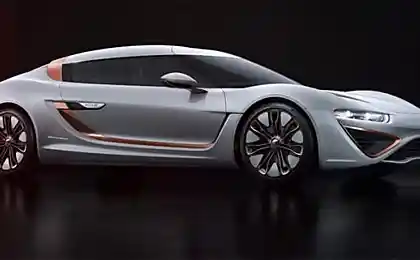617
"Streaming" electric car Quant F issued a record current
Quadruple machine built on the basis of carbon fiber monocoque, externally similar to the previous design (different color corrected optics and the wheels do not count), but the technique significantly redrawn.
Liechtenstein company nanoFlowcell proanonsiroval debut at the Geneva concept electric Quant F with exotic technology NanoFlowsell flow batteries.
Before us is the evolution of last year's supercar Quant e-Sportlimousine. Then the creators of the machine was able to impress the audience. Imagine: four-wheel drive, the peak force of 925, the length of almost 5 to 26 m and mileage of 600 km on a single charge. What can we say about the redesigned models whose engines momentarily develop a total capacity of 1090 hp Cruising has increased to 800 km. No production model on batteries does not possess such characteristics.
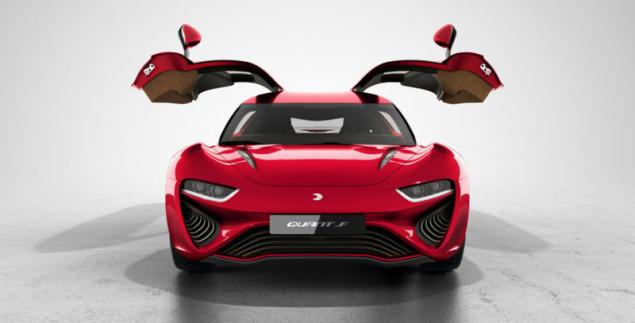
The main part of the system at last year's model example. 1 - two sets of tanks for electrolytes (ionic liquid), 2 - stream battery 3 - intermediate storage for supercapacitors, 4 - motors (one per wheel). The electrolytes are pumped through the battery streaming where react with each other through the membrane, changing its composition and giving the operating voltage.
When charging the process is reversed: the battery voltage is applied to change the electrolyte is pumped through the pipes, turning them out in the discharged charged. Note that the electrolyte in the tank is not consumed, but only changes. But, theoretically, such a machine can be charged and not from the power outlet, and simply pumping the ionic liquids by filling the tanks advance and "charged" compositions.
Flow batteries have long been known, not for the first year are experimenting with them. The trick to a particular implementation: the selection of the reactants, the device key element of such a system - an ion exchange membrane. NanoFlowcell company argues that if the previously shown streaming batteries have the specific capacity per unit mass at about lithium-ion batteries, then NanoFlowsell - five times more. However, the capacity per unit volume is not so rosy, because the same build a passenger car with a big boot to be problematic. But there is a plus: the developers did not disclose the composition of the electrolyte, but insist that they are not toxic and not flammable
.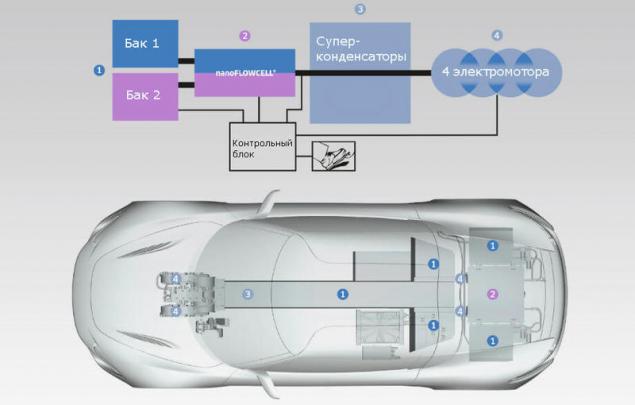
New spoiler with two levels of disclosure is automatically activated at speeds above 80 km / h. The exact maximum speed unknown (engineers say only that more than 300 km / h).
The Quant F developers have increased the volume of the tanks for ionic liquids. Instead of the total of 400 l - 500 l is now. The revised unit receives from the supercapacitor battery current to 50 A, and the motors can momentarily give out more than 2000 A. The creators of the concept argue that they do not know, no electric passenger car, which would be figured so large currents. The tension in the drive system is also impressive: it can now be briefly increased to 735 in (was 600). In long-term mode, it is limited to 400 volts.
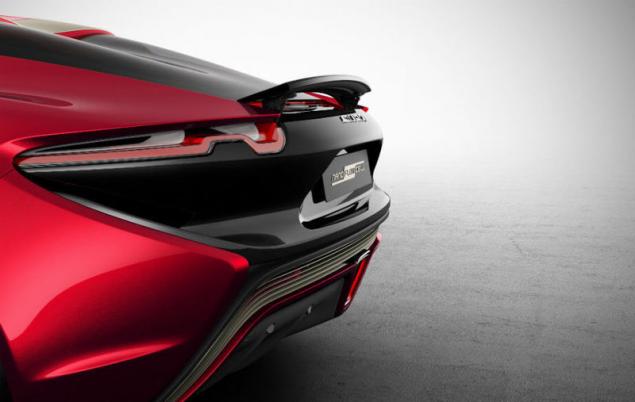
The new headlamps QUANTeYES mounted LCD projectors at work putting out image of the letter Q.
Alteration and transmission has undergone. Now the motors are connected to the wheels through a two-stage automatic transmission. The machine can move in four-wheel drive and rear wheel drive modes. And the electric motors of the front axle in the latter case disconnected from the wheels by means of special couplings, so as not to rotate idly. Recall that last year, the German Technical Inspectorate (TÜV) has officially admitted Quant on the road. But to complete the homologation far.
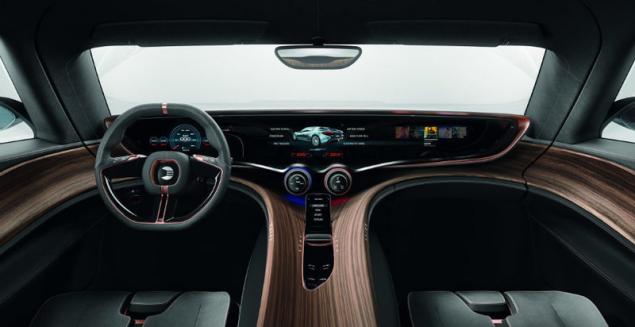
Interior of new items not yet disclosed, so that the present version of the last year. (The Quantum F we promise pillars are narrower than here.)
Technical Director Nunzio La Vecchia said that the external parameters of the new model F 100% of the requirements for mass-produced cars, and the cabin - 90%. Future plans - crash test in Germany and USA. On the possibility of serial production of this miracle, the authors do not say, but maybe give then to some avtoproizvoditelyu technology. Bosch's involvement in the project -. Too hopeful sign
Author: Leonid Popov
Photo: nanoFlowcell
Liechtenstein company nanoFlowcell proanonsiroval debut at the Geneva concept electric Quant F with exotic technology NanoFlowsell flow batteries.
Before us is the evolution of last year's supercar Quant e-Sportlimousine. Then the creators of the machine was able to impress the audience. Imagine: four-wheel drive, the peak force of 925, the length of almost 5 to 26 m and mileage of 600 km on a single charge. What can we say about the redesigned models whose engines momentarily develop a total capacity of 1090 hp Cruising has increased to 800 km. No production model on batteries does not possess such characteristics.

The main part of the system at last year's model example. 1 - two sets of tanks for electrolytes (ionic liquid), 2 - stream battery 3 - intermediate storage for supercapacitors, 4 - motors (one per wheel). The electrolytes are pumped through the battery streaming where react with each other through the membrane, changing its composition and giving the operating voltage.
When charging the process is reversed: the battery voltage is applied to change the electrolyte is pumped through the pipes, turning them out in the discharged charged. Note that the electrolyte in the tank is not consumed, but only changes. But, theoretically, such a machine can be charged and not from the power outlet, and simply pumping the ionic liquids by filling the tanks advance and "charged" compositions.
Flow batteries have long been known, not for the first year are experimenting with them. The trick to a particular implementation: the selection of the reactants, the device key element of such a system - an ion exchange membrane. NanoFlowcell company argues that if the previously shown streaming batteries have the specific capacity per unit mass at about lithium-ion batteries, then NanoFlowsell - five times more. However, the capacity per unit volume is not so rosy, because the same build a passenger car with a big boot to be problematic. But there is a plus: the developers did not disclose the composition of the electrolyte, but insist that they are not toxic and not flammable
.

New spoiler with two levels of disclosure is automatically activated at speeds above 80 km / h. The exact maximum speed unknown (engineers say only that more than 300 km / h).
The Quant F developers have increased the volume of the tanks for ionic liquids. Instead of the total of 400 l - 500 l is now. The revised unit receives from the supercapacitor battery current to 50 A, and the motors can momentarily give out more than 2000 A. The creators of the concept argue that they do not know, no electric passenger car, which would be figured so large currents. The tension in the drive system is also impressive: it can now be briefly increased to 735 in (was 600). In long-term mode, it is limited to 400 volts.

The new headlamps QUANTeYES mounted LCD projectors at work putting out image of the letter Q.
Alteration and transmission has undergone. Now the motors are connected to the wheels through a two-stage automatic transmission. The machine can move in four-wheel drive and rear wheel drive modes. And the electric motors of the front axle in the latter case disconnected from the wheels by means of special couplings, so as not to rotate idly. Recall that last year, the German Technical Inspectorate (TÜV) has officially admitted Quant on the road. But to complete the homologation far.

Interior of new items not yet disclosed, so that the present version of the last year. (The Quantum F we promise pillars are narrower than here.)
Technical Director Nunzio La Vecchia said that the external parameters of the new model F 100% of the requirements for mass-produced cars, and the cabin - 90%. Future plans - crash test in Germany and USA. On the possibility of serial production of this miracle, the authors do not say, but maybe give then to some avtoproizvoditelyu technology. Bosch's involvement in the project -. Too hopeful sign
Author: Leonid Popov
Photo: nanoFlowcell















